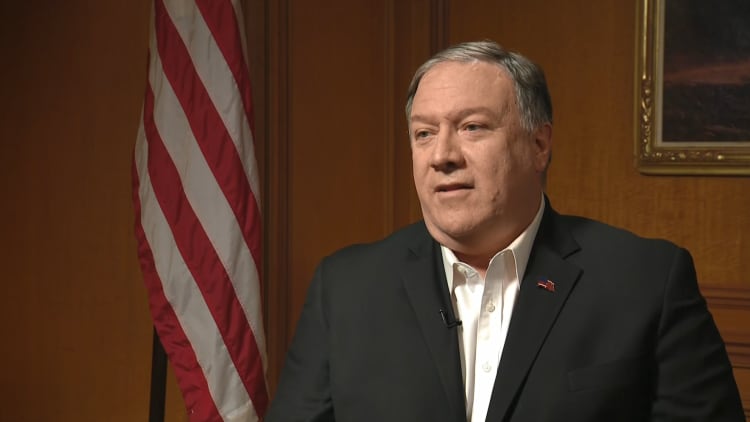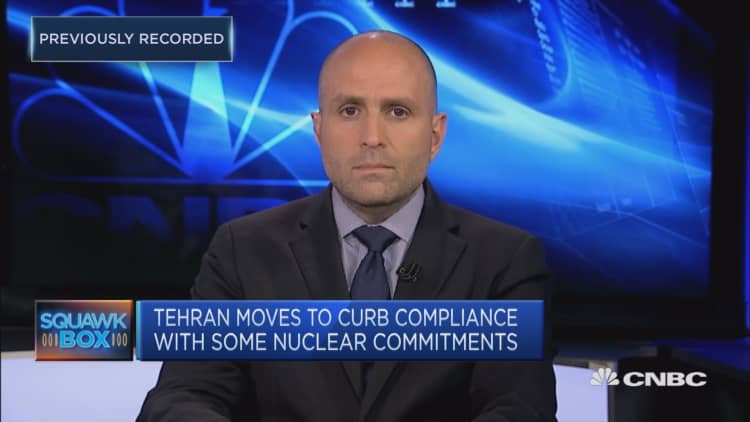
Iran is an active threat to American interests as it sows chaos in the Middle East, but the White House would "of course" welcome the opportunity to negotiate with Tehran, U.S. Secretary of State Mike Pompeo said Saturday.
Speaking with CNBC's Hadley Gamble, America's top diplomat said he's seeing increased threats from Iran, and that President Donald Trump's administration is reinforcing its capacity to respond to any offensive action from Iran. That's why, according to Pompeo, the U.S. deployed a carrier strike group and other weaponry to the region.
"We've done all the right things to increase our security posture to the best of our ability," Pompeo said, "but we also want to make sure that we had deterrent forces in place, so in the event that Iran decided to come after an American interest — whether that be in Iraq, or Afghanistan, or Yemen, or any place in the Middle East — we were prepared to respond to them in an appropriate way."
We're not going to miscalculate: Our aim is not war, our aim is a change in the behavior of the Iranian leadership.Mike PompeoU.S. secretary of state
Despite the greater military presence in the region, the secretary of state stressed that the U.S. isn't looking for a fight — and it wouldn't stumble into one either.
"We're not going to miscalculate: Our aim is not war, our aim is a change in the behavior of the Iranian leadership. We hope the Iranian people will get what they finally want, and what they so richly deserve," he said. "The forces that we're putting in place, the forces that we've had in the region before — you know, we often have carriers in the Persian Gulf — but the president wanted to make sure that, in the event something took place, we were prepared to respond to it in an appropriate way."
Pompeo added that he has prepared diplomatic options so that Trump has choices "in the event that the Iranians make a bad decision."
'Our response will be appropriate'
The secretary of state offered little guidance on what course the White House is likely to pursue in the event of an altercation with Tehran, but he emphasized that Washington would not sit idle.
"An attack on American interests from an Iranian-led force, whether it's an Iranian proper or it's an entity that is controlled by the Iranians, we will hold the responsible party accountable. President Trump has been very clear about that: Our response will be appropriate."
Altering Iran's influence around the world is also a target for the White House: "Iran is the major destabilizing influence in the Middle East, and we aim to fix that," Pompeo said, pointing to Tehran's role in terrorism, the flow of weapons into unstable countries, and "a radical increase in Iranian-supported entities."
These sanctions are directed at the Iranian leadership to change their behavior — point blank, point blank. The Iranian leadership understands the cost that is being imposed.Mike PompeoU.S. secretary of state
America's primary strategy for addressing that situation is its sanctions on Iran. Those economic restrictions have led to tough conditions for everyday Iranians — inflation in Iran has spiked to a staggering 40% and could go higher, according to the International Monetary Fund. And the country's currency is down about 60% this year.
Pompeo argued, however, that the United States is targeting only the country's rulers.
"These sanctions are directed at the Iranian leadership to change their behavior — point blank, point blank," the American official said. "The Iranian leadership understands the cost that is being imposed. This is a kleptocratic regime that has stolen billions of dollars and wastes the Iranian people's own money on these proxy wars all across the world."
"The Iranian government, while its people are suffering, according to them, is spending money in Venezuela. They're sending forces to Venezuela," he added. "This is not a leadership that reflects what the Iranian people want."
Pompeo has claimed before that Hezbollah, a proxy of the Iranian government, operates in Venezuela.
Despite the open antagonism between Washington and Tehran, Pompeo nevertheless repeated that the White House would be happy to receive overtures from Iran to sort out some of their differences.
"Of course we would welcome that call. Of course we want a peaceful diplomatic resolution to each of these conflicts that we've talked about here today," he told CNBC. "That makes perfect sense."
Doubts over diplomacy
Many regional analysts doubt the administration's sincerity when it comes to welcoming a diplomatic solution, and they use administration officials' previous statements on Iran to make their point.
"As someone who just a few years ago preferred to resolve the Iranian nuclear standoff by destroying the program with '2,000 sorties', it is hard to believe that Secretary Pompeo is primarily motivated by reaching a diplomatic settlement with Iran," Ali Vaez, director of the Washington D.C.-based Iran Project, told CNBC via email.
"With so much tension and friction between the two countries and no channel of communication or exit ramp, it appears that the Trump administration has no effective de-escalation strategy other than hoping that its muscle flexing would scare the Iranians. That is a perilous gambit."
Vaez added that the impact of U.S. sanctions on ordinary Iranians contradicts Pompeo's overtures of support for the Iranian people.
—CNBC's Natasha Turak and Emma Graham contributed to this article.
WATCH: US is being 'deliberately provocative' to Iran



